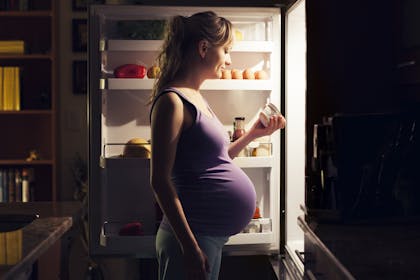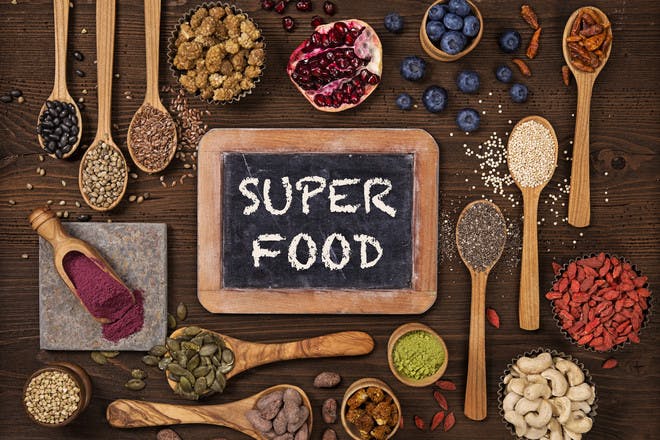Healthy eating in pregnancy: foods to eat and foods to avoid

This page contains affiliate links, which means we may earn a small amount of money if a reader clicks through and makes a purchase. All our articles and reviews are written independently by the Netmums editorial team.
Once you find out you're pregnant, it's time to make some changes to your diet. From cutting out alcohol to cutting down on caffeine, make sure you know what's safe to eat and drink during pregnancy. Plus, find out about the latest food safety advice regarding frozen vegetables.
It can be confusing to know what's best to eat and what not to eat when you're pregnant. Now the Food Standards Agency, Food Standards Scotland, Public Health England and Health Protection Scotland are reminding people that most frozen vegetables, including sweetcorn, need to be cooked before eating.
This includes if adding them to salads, smoothies or dips.
It's due to an ongoing listeriosis outbreak affecting five European countries including the United Kingdom.
FREE NEWBORN NAPPIES
Listeriosis is a rare but serious foodborne illness, caused by the bacterium Listeria monocytogenes that can be more serious for those individuals who have weakened immune systems and also the elderly, pregnant women and infants.
It's thought that frozen sweetcorn is the likely source but there's now an updated product recall that extends to a number of brands of frozen vegetables.
Find the full list of products affected here.
As well as cooking frozen vegetables thoroughly before eating during pregnancy, there are other guidelines relating to food and drink during pregnancy. Keep reading to find out else you can and can't eat, as well as what to avoid or limit, over the next nine months ...

What you need to avoid during pregnancy
From alcohol to sushi
Drinking alcohol during pregnancy
Advice has changed recently and it's now recommended that you avoid drinking alcohol altogether if you're pregnant or trying to get pregnant.
According to the NHS, drinking alcohol, especially in the first three months of pregnancy, increases the risk of:
- miscarriage
- premature birth
- your baby having a low birth weight.
Studies have also shown that drinking during pregnancy can result in foetal alcohol syndrome, which can cause:
- growth problems
- facial abnormalities
- learning and behavioural problems
Can I drink tea and coffee during my pregnancy?
Since 2008, the Food Safety Authority (FSA) has recommended that pregnant women keep their caffeine intake to under 200mg a day.
Guidelines have remained the same regarding caffeine intake during pregnancy, which means there's no harm in having a cup of tea or a yummy latte over the next nine months.
However, a recent survey by UK pregnancy and baby charity Tommy's revealed that lots of us are exceeding 200mg of caffeine.
Why? Firstly because we don't realise how much caffeine's in a cup of tea or coffee. A cup of instant coffee contains 100mg; a cup of tea 75mg.
And secondly because we don't realise how many other foods it's 'hidden' in – aside from tea and coffee.
For instance, chocolate, fizzy drinks and energy drinks also contain caffeine. A can of cola contains 50mg while a 50g bar of milk chocolate contains 10mg, which contribute to our daily intake.
Babies of pregnant women who consume over 200mg of caffeine per day are at an increased risk of foetal growth restriction, and this can result in low birth weight and/or miscarriage.
Work out how much caffeine you're consuming, use this caffeine calculator.
And you can find out more by watching this short video ...
Is sushi safe to eat during pregnancy?
Although raw fish is generally something to steer clear of when you're pregnant, if the fish used to make your sushi has been frozen first then this is considered safe to eat.
That's because freezing the fish will kill off any parasites that may be present.
Ask the shop or restaurant before you buy it. If they don't know or you're not sure then it's best to avoid it.
Smoked salmon and smoked trout are both safe to eat during pregnancy.
See below for more about raw fish and shellfish during pregnancy.
Is cheese safe during pregnancy?
Cheese is a bit of a complicated one. Although plenty of cheeses are safe to eat when you're pregnant, there are lots that you'll need to avoid, too.
It mainly depends on whether it's hard or soft, first of all.
All hard cheeses are safe to eat during your pregnancy, so Cheddar, Double Gloucester, Parmesan, Stilton are absolutely fine.
Soft cheeses made from pasteurised milk are fine to eat, such as goat's cheese, mozzarella, feta.
However, soft cheeses with white (mould-ripened) rind, such as camembert and brie, as well as soft blue cheese (Gorgonzola, Roquefort) should be avoided. These can be eaten cooked as this will kill off the bacteria but make sure it's steaming hot inside.
This is because certain soft cheeses can be an ideal environment for harmful bacteria, such as listeria, to grow in.
Find out exactly which cheese are safe to eat in our comprehensive cheese list below!
Cheddar
Parmesan
Stilton
Cottage cheese
Mozzarella
Feta
Cream cheese
Paneer
Ricotta
Halloumi
Cooked or hard forms of goats' cheese
Cooked soft blue cheeses
Processed cheeses, such as cheese spreads
Brie
Camembert
Chèvre goats' cheese (mould-ripened soft goats' cheese)
Danish blue
Gorgonzola
Roquefort
Soft blue-veined cheeses
Can I eat soft-boiled eggs during pregnancy?
Until fairly recently, only cooked through eggs were allowed during pregnancy. But the rules have relaxed and you can now enjoy dippy eggs and poached eggs, provided you're using British Lion eggs.
Only eggs produced under the British Lion Code of Practice are safe for pregnant women to eat raw or partially cooked. These eggs have a red lion logo stamped on their shell.
You should avoid any raw or undercooked eggs not produced under the lion code, and any foods that contain them such as homemade mayonnaise.
Make sure eggs without the lion code are thoroughly cooked until the whites and yolks are solid. This prevents the risk of salmonella food poisoning.
Duck eggs, quail eggs and goose eggs should be cooked until the whites and yolks are solid.
Can I eat nuts during pregnancy?
The debate about whether these are safe to eat during pregnancy has raged for years but current advice is that they are safe, unless you have an allergy.
Latest research has shown no clear evidence that eating peanuts during pregnancy affects the chances of your baby developing a peanut allergy.
Are BBQs safe during pregnancy?
It's fine to eat barbecued meat as long as it's cooked right through and is piping hot.
Best to give the burgers that have been idling on the grill a wide berth, as nasties such as E.Coli or campylobacter could give you food poisoning.
The same advice goes for fish - make sure it's piping hot and fresh off the grill when you eat it.
Can I eat prawns during pregnancy?
You can't eat any raw shellfish during pregnancy because it might contain harmful bacteria and viruses that cause food poisoning.
What else can't I eat during pregnancy?
Don't eat liver or liver products such as liver pâté or liver sausage, as they may contain large amounts of vitamin A, which can be harmful to your unborn baby.
Don't eat paté. Avoid any other meat, fish or vegetable pates as they could contain listeria.
Don't eat more than two portions per week of oily fish (for example, mackerel, trout or fresh tuna), or more than four cans of tuna (around 140g per can).
Oily fish can contain pollutants while tuna contains more mercury than other types of fish.
Don't eat marlin, shark or swordfish. These can contain high levels of mercury, which can damage your baby's developing nervous system.
Avoid eating liquorice root. However, you can still have moderate amounts of liquorice sweets or liquorice teas in pregnancy.
And well as watching what you eat, good hygiene is essential.
Always wash your hands before preparing or eating food, and feel free to hand over some of the less glamorous tasks in life, like clearing up after your dog or cat, to your other half.
Cat poo can contain a parasite called toxoplasmosis which can be dangerous to your unborn baby, causing eye problems or brain damage.
What should I eat during morning sickness?
If you're reading this through the queasiness of morning sickness, well done for getting this far!
While eating or drinking is the last thing on your mind when you're battling waves of nausea or bouts of sickness, eating little and often can help ease symptoms. Staying hydrated is really important too, so try sipping on ginger tea, which many mums say can help.
Find more tips on getting through morning sickness here.
How do I eat healthily during my pregnancy?
Eating a variety of foods will help your baby to get the range of nutrients that it needs to develop and be healthy. These include:
- Fruit and vegetables: try to eat at least 5 portions of fruit and veg a day, to provide the vitamins, minerals and fibre your baby needs.
- Starchy foods (carbohydrates): such as bread, potatoes, breakfast cereals, rice, pasta and noodles. Try to eat wholemeal versions if you can.
- Protein: foods like meat, fish, poultry, eggs, beans, pulses and nuts. Protein provides the building blocks for your baby to grow.
- Dairy products: includes milk, cheese and yoghurt. These contain calcium, essential for healthy bones.
Try to only eat a small amount of foods that are high in sugar or fat.
Find out more about healthy eating during pregnancy here.
Should I eat for two now that I'm pregnant?
While it's tempting to 'eat for two', official advice says that's not necessary.
The NHS now says pregnant women only need to consume an extra 200 calories a day – and that's only in the final trimester of your pregnancy. That’s the same as two slices of wholemeal or wholegrain toast and margarine or a small glass of orange juice.
Dr Helen Ford, Head of Nutrition at Glenville Nutrition Clinics explains:
'Many women use pregnancy as an excuse to overeat because of the growing baby! However, we know that the extra demands are only in the last trimester when the baby is in need of additional fuel and nutrients. The emphasis should be on quality of food and not just quantity.'




